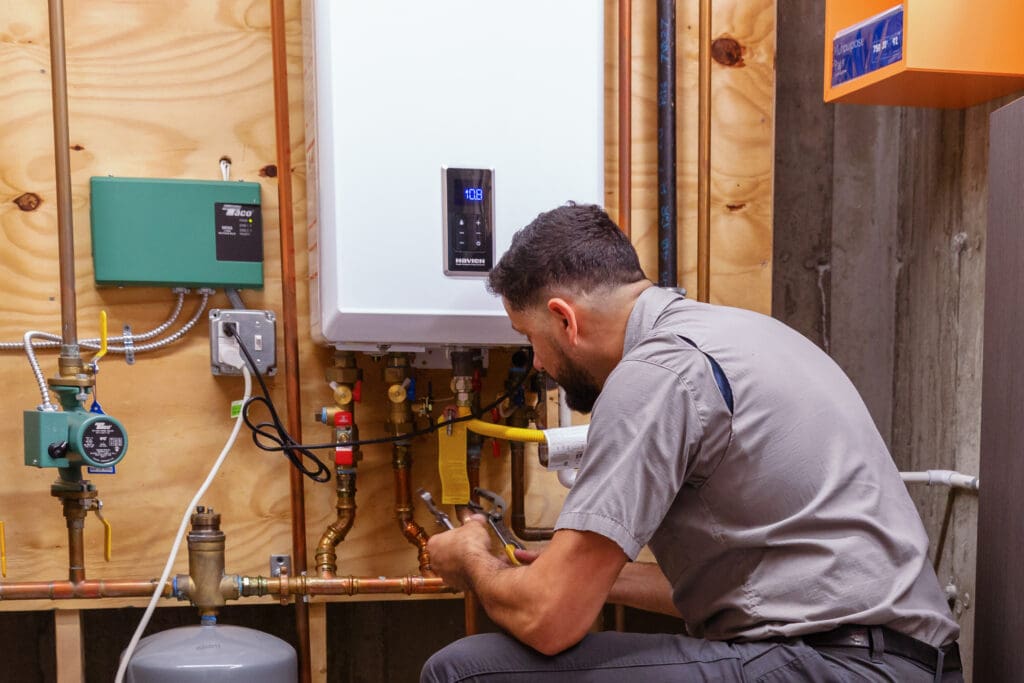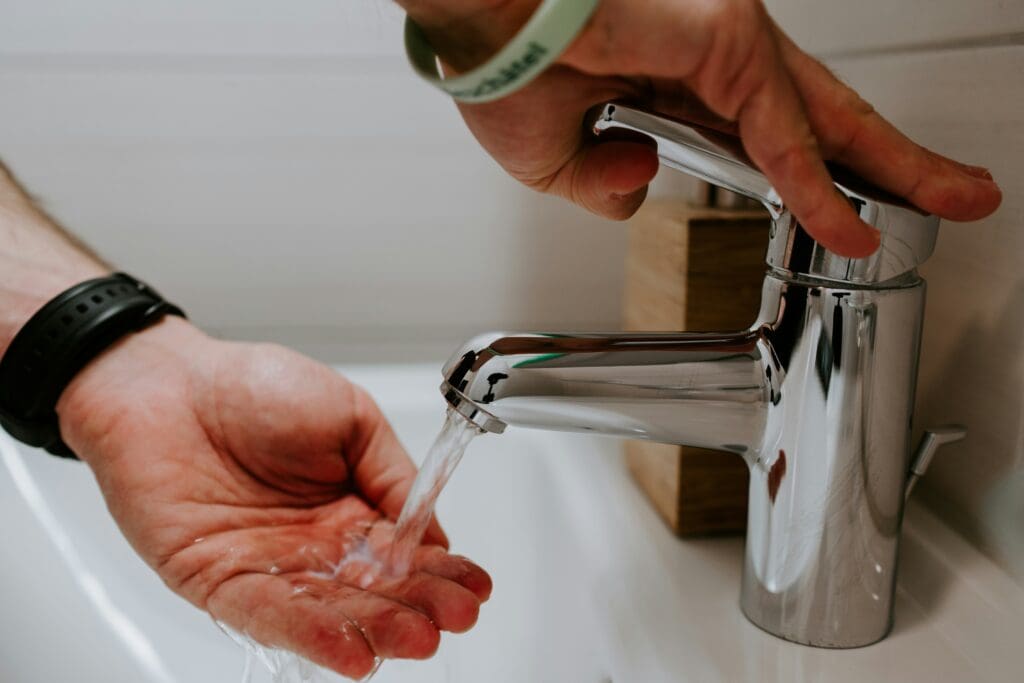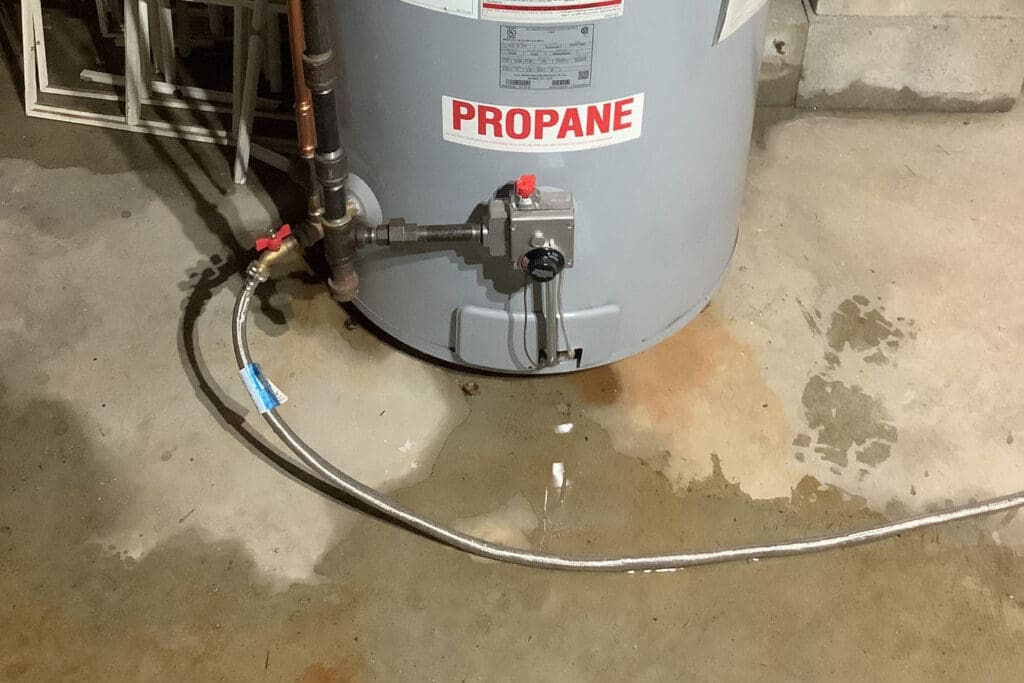In residences, the water heater stands as a pivotal appliance, delivering a consistent source of hot water for daily necessities. However, akin to any machinery, water heaters can develop complications. Among the prevalent issues encountered by homeowners, a leaking water heater takes the forefront. These leaks emanate from diverse sources, spanning from regular wear and tear to malfunctioning components. Understanding the root cause of these leaks is pivotal for effective diagnosis and resolution. The principal triggers include:
- Aged Tank
As the water heater matures, deterioration and corrosion become recurrent issues. The persistent temperature fluctuations exert stress on the tank, leading to water heater leaks or minute cracks. If your water heater exceeds a decade in service, contemplating replacement may be prudent.
2. Loosened Drain Valve
The drain valve, employed for tank drainage during routine maintenance, may cause leaks if not securely closed or if it becomes loose. Regular inspections and ensuring a tight seal can avert these water heater leaks.
3. Elevated Water Pressure
Manufacturers engineer water heaters to function within specified pressure limits. Excessive water pressure necessitates heightened effort from the tank and components to contain it. Regularly assess your home’s water pressure and consider installing a pressure-reducing valve.
4. Malfunctioning T&P Valve
The temperature and pressure release valve (T&P) acts as a crucial safety feature, releasing excess pressure to prevent tank explosions. Wear or breakage can result in leaks. Scheduled inspections and prompt repairs ensure the system’s safe and efficient performance.
5. Tank Cracks
Manufacturing defects or physical harm can induce cracks in the tank. Over time, these cracks expand due to heating cycle-induced contractions and expansions, ultimately leading to leaks. Replacement is generally the optimal solution for this issue.
6. Hard Water
Residing in an area with hard water, characterized by elevated mineral content, can lead to sediment buildup in the tank. This sediment strains the water heater, causing overheating and tank damage. Periodic tank flushing helps mitigate this accumulation.
7. Inlet and Outlet Connections
Leakage may stem from loose or corroded inlet and outlet connections. Regular scrutiny, tightening of connections, and replacing rusted components mitigate the risk of leaks.
8. Anode Rod
Designed to attract corrosive elements, the anode rod safeguards the tank from corrosion. However, a worn-out rod can result in tank rusting and leakage. Regular checks and replacements prolong the water heater’s life, averting costly damage.

Identifying Leak Sources
Water heaters, over time, may develop various issues, with leakage being a significant concern. Pinpointing the origin of water heater leaks is crucial for effective troubleshooting. Common water heater leak points include:
Bottom Water Heater Leaks
escaping from the bottom typically signifies sediment buildup within the tank. Regular tank flushing minimizes sediment, maintaining efficiency.
Top Water Heater Leaks
Leaks from the top often result from compromised outlet or inlet connections. Regular inspections and maintenance of these connections prevent top leaks.
Condensation
Condensation, often mistaken for leaks, occurs when cold water interacts with the tank’s warm surface. Managing temperature and ensuring proper ventilation eliminate condensation-related puddles.
Internal Water Heater Leaks
Internal leaks, challenging to detect without specialized equipment, may result from corrosion, aging, or a worn-out anode rod. Such leaks often signal the need for water heater replacement.
Preventing Water Heater Leaks
Addressing water heater leaks promptly is crucial to conserve resources and prevent home damage. Proactive measures and regular maintenance can mitigate the risk of water heater leaks:
- Regular Inspection: Periodically check for signs of corrosion, rust, or water around the base to detect issues early.
- Tank Maintenance: Drain and clean the tank annually to remove sediment, improving efficiency and longevity.
- Professional Maintenance: Annual professional maintenance ensures early issue detection and safe, efficient operation.
- Tightening Loose Parts: Regularly tighten fittings, connectors, and valves to counteract wear and tear.

Water Heater Repair & Replacement Services: Dealing with a malfunctioning or leaking water heater can be vexing and, in some cases, hazardous. The seasoned plumbers at Sharp Plumbing and Heating offer adept repair and replacement services, ensuring an uninterrupted hot water supply. Beyond water heater services, our skilled plumbers in Framingham, Natick, Berlin, and Worcester deliver a spectrum of plumbing solutions, prioritizing quality, reliability, and customer-centric service. Opt for Sharp Plumbing and Heating for a plumbing partner dedicated to meeting your needs consistently.


